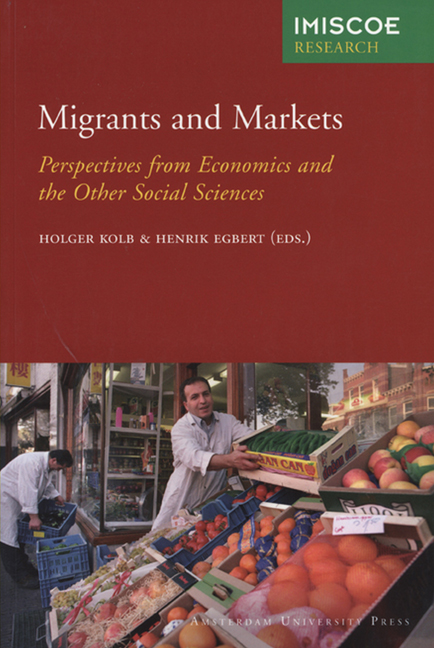Book contents
- Frontmatter
- Contents
- Introduction: Migrants and Markets: Perspectives from Economics and the Other Social Sciences
- The Impact of Immigration on the Labour Market: A Survey
- Investigating the Economic Impact of Immigration on the Host Country: The Case of Norway
- The Exit Option of Labour Migration from East to West Germany: Individual and Contextual Determinants of Unemployed Workers’ Geographic Mobility
- How Recent Amendments in German Immigration Law Affect Decisions: The Case of Polish Doctors
- Educational Selectivity and Labour Market Attainment of Jewish Immigrants from the Former Soviet Union in Israel and Germany in the 1990s
- States as Clubs? The Political Economy of State Membership
- Chinese Student Migration in Europe: A Migration That Nobody Objects To?
- Assessing Interdependencies between Sector Structures and Labour Migration: A Comparative Study of the British and the German Health Sectors
- Workers’ Remittances and International Risk Sharing
- Skills and Remittances: The Case of Afghan, Egyptian and Serbian Immigrants in Germany
- The Impact of Migration on Foreign Trade in Bolivia
- List of Contributors
- Other IMISCOE Titles
States as Clubs? The Political Economy of State Membership
Published online by Cambridge University Press: 02 February 2021
- Frontmatter
- Contents
- Introduction: Migrants and Markets: Perspectives from Economics and the Other Social Sciences
- The Impact of Immigration on the Labour Market: A Survey
- Investigating the Economic Impact of Immigration on the Host Country: The Case of Norway
- The Exit Option of Labour Migration from East to West Germany: Individual and Contextual Determinants of Unemployed Workers’ Geographic Mobility
- How Recent Amendments in German Immigration Law Affect Decisions: The Case of Polish Doctors
- Educational Selectivity and Labour Market Attainment of Jewish Immigrants from the Former Soviet Union in Israel and Germany in the 1990s
- States as Clubs? The Political Economy of State Membership
- Chinese Student Migration in Europe: A Migration That Nobody Objects To?
- Assessing Interdependencies between Sector Structures and Labour Migration: A Comparative Study of the British and the German Health Sectors
- Workers’ Remittances and International Risk Sharing
- Skills and Remittances: The Case of Afghan, Egyptian and Serbian Immigrants in Germany
- The Impact of Migration on Foreign Trade in Bolivia
- List of Contributors
- Other IMISCOE Titles
Summary
Introduction
Citizenship is generally regarded as a very important topic within the various disciplines in the social sciences. The only exception appears to be economists, many of whom openly regard their discipline as the ‘queen of the social sciences’ (Van Suntum 1999; see for a critique Frey 1990: 15-19). Although economics has transgressed the boundaries of its assumed core competences, has tried to analyse phenomena which did not seem to be of a major interest for economists1 and has thus been accused of being imperialist (Pies 1998), no elaborate ‘economics of citizenship’ has yet been developed (see also Kirchga¨ssner 1995). Very recently, however, Straubhaar (1992, 2002, 2003) has taken up this question and has analysed states and clubs in a comparative perspective (see also Schäfer 1998). This perspective will be adopted and further investigated. I start in section two by presenting the implications of the economic club theory and by linking them with states and state membership. Further to this, the most important differences between clubs and states will be discussed. As a main discrepancy the membership differences will be considered, as will the consequences which would occur if states act exclusively under the terms of the recommendations and assumptions of club theory. Proceeding from the assumption that two different categories of membership exist, one of birth membership and one of acquired membership (immigration), section three identifies family policy and immigration policy as relevant fields of action for state membership policies. While this is much more obvious for membership by acquisition (immigration) than for birth membership, which is analysed in more detail, it will be argued that the implications of club theory remain valid for birth membership, however in a different manner. Section four exemplifies these considerations by stressing concrete policies. Section five concludes and complements with some remarks concerning the status of club theory and their implications for state membership policies.
Club theory as a starting point for discussing state membership
The connection of states and clubs actually becomes apparent in everyday semantics. In the same way that clubs compete against each other the same applies to states, examples for this being foreign direct investments and highly skilled migrants. Competition therefore is one common feature of states and clubs.
- Type
- Chapter
- Information
- Migrants and MarketsPerspectives from Economics and the Other Social Sciences, pp. 120 - 146Publisher: Amsterdam University PressPrint publication year: 2008



